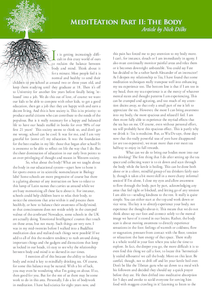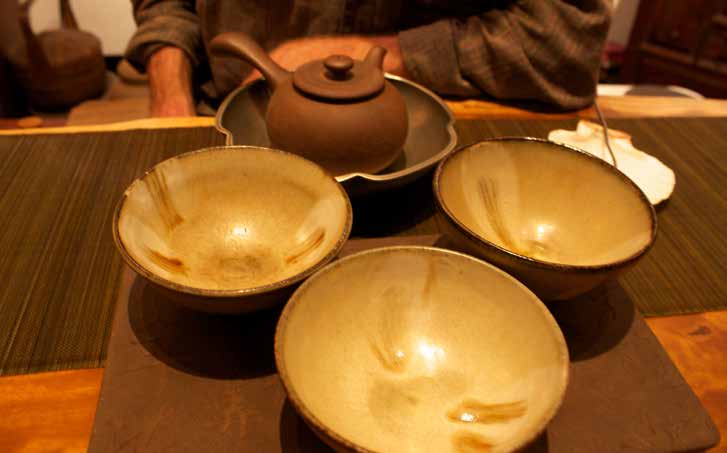
 |
|
It is getting increasingly difficult in this crazy world of ours to reclaim the balance between body and mind. Think about it for a minute. Most people feel it is normal and healthy to send their children to pre-school at around two or three years old, and keep them studying until they graduate at 18. Then it's off to University for another few years before finally being 'released' into a job. We do this out of love, of course: we want our kids to be able to compete with other kids, to get a good education, then get a job that they are happy with and earn a decent living. And this is how society is. This is its priority: to produce useful citizens who can contribute to the needs of the populous. But is it really necessary for a happy and balanced life to have our heads stuffed in books for over 90% of our first 21 years? This society seems to think so, and don't get me wrong; school can be cool. It was for me, and I am very grateful for (some of ) my education. It was the foundation for the best studies in my life: those that began after school! It is awesome to be able to reflect on life the way that I do. But the sheer domination of education in our early lives points to an over-privileging of thought and reason in Western society.

So, what about the body? What are we taught about the body in our educational system - apart how to hone it for sports events or its scientific nomenclature in Biology labs? Some schools are more progressive of course but there is a glaring absence of any instruction on how to relate to this lump of Latin names that carries us around while we are busy memorizing all these facts about it. For instance, schools could help children learn to relax their body, to notice the emotions that arise within it and process them healthily, or how to balance their awareness of body/mind, so that consciousness does not reside solely in the cramped walnut of the cerebrum! Nowadays, some schools in the UK are actually doing 'Emotional Intelligence' courses that touch on these areas, but not many. Such things are very new. I was in my mid-twenties before I walked into a Buddhist meditation class and realized such things were possible! If we add to all of this the modern tendency to rush around doing important things and the gadgets and distractions that keep us locked in our heads, it's easy to see why the relationship between body and mind is so skewed in our times.
I mention all of this because the ability to balance body and mind is key to mindfully drinking tea. Of course, for some this balance may be natural. With a bit of luck, you may even be wondering what I'm going on about. If so, then good for you. But for the rest of us there may be some work to do in this area. Personally, I do a lot of bodywork in meditation. I have had sciatica for eight years now, and Article by Nick Dilks this pain has forced me to pay attention to my body more. I can't, for instance, slouch or I am immediately in agony. I also must continually monitor painful areas and relax them or it becomes downright unbearable. You could say Fate has decided to be a rather harsh Alexander of an instructor! As I deepen my relationship to Tea, I have found that some meditation techniques really transpose well into enhancing my tea experience too. The bottom line is that if I am too in my head, then my tea experience is at the mercy of whatever mental states and thought patterns I am experiencing. This can be cramped and agitating, and too much of my attention drains away, so that only a small part of me is left to appreciate the tea. However, the more I can bring awareness into my body, the more spacious and relaxed I feel. I am then more fully able to experience the myriad effects that the tea has on me. Of course, even without personal effort, tea will probably have this spacious effect. This is partly why we drink it: Tea is medicine. But, as Wu De says, these days now that the really powerful teas of yore have disappeared (or are too expensive), we must more than ever meet tea halfway to enjoy its full rewards.
What can we do to bring our bodies more into our tea drinking? The first thing that I do after setting up the tea space and collecting water is to sit down and scan through the body while the kettle is boiling. This can be done both alone or in a silent, mindful group of tea drinkers fairly easily, though it takes a bit more skill in a more chatty informal session! If I'm alone, I close my eyes and allow awareness to flow through the body, part by part, acknowledging any areas that feel tight or blocked, and letting go of any tension I am able to - sending kindness to the rest. It really is quite simple. You can either start at the top and work down or vice versa. The key is to directly experience your body, not experience the thought-about-it. This means that we do not think about say our foot and connect solely to the mental image we have of it stored in our brains. Rather, the body scan is about moving awareness to directly experience sensations in the foot: feelings of warmth or coldness, flow or stagnation, pressure from contact with the floor, tension or relaxation: the bare energy of that space. There really is a whole world in your foot when you take the time to explore. In fact, the deeper you go, the more difficult it is to even find this thing we call a foot, to locate this 'hermetically sealed silhouette' we call the body. More on this later. Be careful, though, not to drift off and let your kettle boil over. Don't be like the Tibetan guru who sat down to a meal with his followers and decided they should say a quick prayer before they ate. He then drifted into meditative absorption for 5 days and awoke to scold everyone for serving him food with maggots crawling in it! Learning to listen to the emerging 'wind soughing the pines' whilst scanning can be a delightful process, rather like watching spring snow for the first signs of green tips of grass poking through. One moment there is silence and emptiness, the next moment, form. Focusing in this way really helps us to get out of our heads and emerge from the tyranny of thoughts. The key to doing this is to become more interested in something else, and the sensations of the body along with listening for the nascent sounds of the kettle are a great way to do this.
Whether I am alone or in a group, I keep returning to my body as the tea session progresses. Obviously, more of my attention will gravitate towards the mouth sensations as I start to drink the tea. This is a whole other topic that is covered in many of the gongfu experiments in back issues of this newsletter or The Leaf. But it is not just about flavors and aromas. Scanning through the body really helps me to connect to the tea's Qi too. The more I am aware of my body, the more aware I am of the tea's energy flowing through me. This is something that I really enjoy exploring, and if I'm alone, I'll often have a few drinks and then take the kettle off the burner while I close my eyes and explore this world. What changes have happened energetically as the tea diffuses through my being? Is it a gentle, Yin energy or Yang? Constant or wave-like? Superficial or deep within my body? Mainly in the limbs or in my torso? Radiating outwards or towards the core, and so on? By doing this, I am deepening my connection to Tea. I am not just coming away from a session with some vague sense that something has shifted for the better; I am actually exploring the energetic changes directly in my body. By doing this I feel that I am meeting tea halfway and opening myself to its healing energy. Tea can open blockages. It can release traumas held in the body, and so much more. But I think it is much less likely to do so, if I am stuck in my thoughts and mental states a short distance away from my body.
The great thing about tuning into the body is that bodily sensations always happen now! If we are present in this way, it is much more difficult to drift off into past and future - away from Life. Too many people, myself included, are guilty of John Lennon's famous admonishment that 'Life is what happens while we are busy making other plans'. I, for one, use my tea drinking sessions to practice returning to the present when my mind drifts off. Tea is an awesome aid for this practice. This is why the Zen monks of old took tea onto their zafus with such zeal. I hope this article acts as inspiration for some of you to more consciously bring the body into your tea, as well as tea into your body. At the very least, it should help to make your tea more spacious and enjoyable. Even if you just pay more attention to your posture and keep that spine alert, you will notice the benefits. But the body is more than a mindfulness tool. It is also a gateway to vastness. As we explore, where does it really end? Is our assumption of a mental outline to the body real or just mind-made? Why not drink some tea, close your eyes and have a look for yourself?
The summer soft surrenders To the Autumn's cooler breeze, But I'm too caught in mundane thought To spot such things as these.
